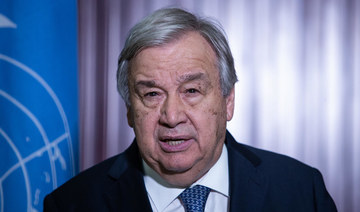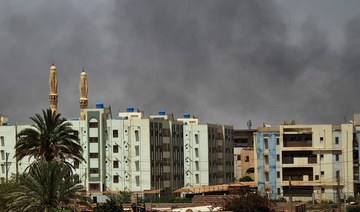NEW YORK: UN Secretary-General Antonio Guterres on Wednesday rejected a request from Sudan’s military leader Gen. Abdel Fattah Burhan to remove his office’s special envoy, but said the Security Council has the final say on the fate of the world body’s overarching mission in the conflict-ravaged nation.
Guterres’ remarks, outlining his “full confidence” in Volker Perthes, as special representative of the secretary-general, came after briefing a closed Security Council meeting. The UN chief had requested the meeting to discuss the situation in Sudan and Burhan’s letter seeking the removal of the allegedly “partisan” Perthes, who serves as the special representative for Sudan, and head of the UN Integrated Transition Assistance Mission in Sudan, or UNITAMS.
This is only the fifth time during his mandate that Guterres has requested a meeting of the Security Council behind closed doors.
The closed Security Council meeting came days after the UN chief had received a letter from Burhan, Sudan’s military leader and chairperson of the Transitional Sovereign Council, asking for Perthes to be removed from his post.
Guterres told reporters in New York after the Security Council consultations: “In relation to the situation in Sudan, there are areas of responsibility of the Security Council and there are areas of responsibility of the secretary-general.
“In my area of responsibility, I reaffirmed to the council my full confidence in Volker Perthes as special representative of the secretary-general.
“It is up to the Security Council to decide whether the Security Council supports the continuation of the mission for another period or whether the Security Council decides that it is time to end it.”
Spokesperson Stephane Dujarric said that Guterres was shocked by Burhan’s letter. He added that the secretary-general was proud of Perthes’ work in Sudan and backed him.
Burhan reportedly accused Perthes of “being partisan,” and claimed the envoy’s strategy in pre-war talks between the generals and the pro-democracy movement aggravated the conflict.
Last year, Burhan accused Perthes of “exceeding the UN mission’s mandate and blatant interference in Sudanese affairs.” He threatened to expel him from the country.
Perthes had earlier this month told the Security Council that the responsibility for the fighting “rests with those who are waging it daily: the leadership of the two sides who share accountability for choosing to settle their unresolved conflict on the battlefield rather than at the table.”
According to the UN, at least 730 people have been killed and 5,500 injured since the outbreak of hostilities last month. The actual toll could be much higher.
Clashes between Burhan’s forces and the Rapid Support Forces, or RSF, a paramilitary group led by Gen. Mohamed Hamdan Dagalo have continued across several parts of the country, including in the capital Khartoum, and in Zalingi, Central Darfur, Al-Fasher, North Darfur and Al-Obeid.
The internal displacement of Sudanese civilians and the influx of refugees into Sudan’s neighboring states have also been a source of concern for Security Council members. The International Organization for Migration has said that over 1.2 million people have so far been internally displaced since April 15 and about 370,000 have sought refuge in the Central African Republic, Chad, Egypt, Ethiopia and South Sudan.
Dujarric said that IOM’s estimates “are based on preliminary reports from field teams while additional reports are likely to emerge as humanitarian access improves.”
That is while on Wednesday Sudan’s military announced that it would no longer engage in talks with the RSF that it accused of “repeated violations” of the humanitarian ceasefire, including their continued occupation of hospitals and other civilian infrastructure in the capital, Khartoum.
On May 20, both sides signed a ceasefire agreement as part of US-Saudi facilitated talks in Jeddah. It demanded a seven-day ceasefire to allow for the delivery of emergency humanitarian aid and the restoration of basic services. The warring parties agreed to protect civilians from violence and refrain from targeting civilian infrastructure or population centers and from acquiring military supplies, including from foreign sources.
In a joint statement issued on May 26, Saudi Arabia and the US said that the monitoring committee had observed significant breaches of the May 20 agreement, including the use of artillery, military aircraft, and drones in Khartoum, as well as clashes in the town of Zalingi in Darfur. Riyadh and Washington “cautioned the parties against further violations and implored them to improve respect for the ceasefire.”
So far, there have been seven declared ceasefires in the country, all of which have been violated. The two sides have accused each other of these violations.
In another joint statement Sunday, the US and Saudi Arabia called out both warring sides for specific breaches of the weeklong truce, saying the military continued to carry out airstrikes, while the RSF was still occupying people’s homes and seizing properties. Fuel, money, aid supplies and vehicles belonging to a humanitarian convoy were stolen, with theft occurring both in areas controlled by the military and by the RSF, the statement added.
A spokesman for Burhan said on Wednesday that by suspending participation in the talks with the RSF the military wants to ensure that the terms of a US-Saudi-brokered truce “be fully implemented” before discussing further steps. The RSF has for its part said it “unconditionally backs the Saudi-US initiative.”
Meanwhile members of the Security council are negotiating a draft resolution renewing UNITAMS’ mandate, first introduced in 2020, which is due to expire on June 3, amid diverging views on how to reflect the situation in the country.
Dujarric said that meanwhile “the mission continues to do its job the best it can, given the circumstances. We continue to have a political presence in Port Sudan. Mr. Perthes will make his way back to the region, I believe, in early next week.
He added: “I don’t think I want to say we’re getting great or good cooperation (from) both sides. We are able to deliver humanitarian goods in certain places when we can manage to talk to the men with guns and to ensure safe passage.
“(The) WFP (World Food Programme) has been able to resume food distribution in Khartoum. We’ve had a large number of trucks being able to move. But what we would like to see is a nationwide cessation of hostilities, so we don’t have to do a case-by-case negotiation for each convoy or each movement, which is time consuming and which is also risky.”


























